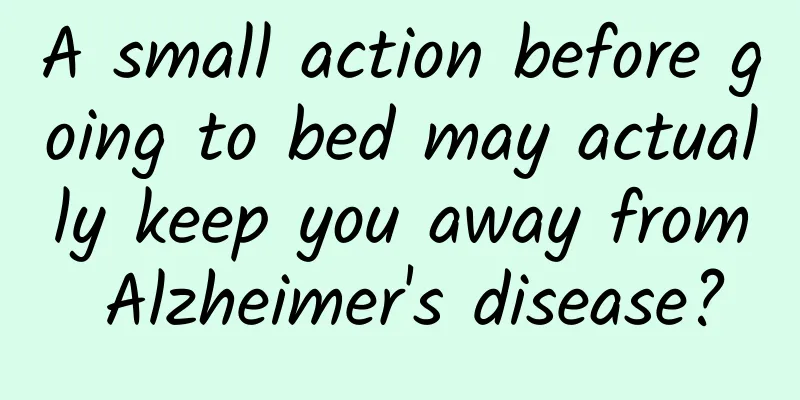A small action before going to bed may actually keep you away from Alzheimer's disease?

|
Perhaps, you who live in the city always enjoy being awakened by the sunshine in the morning, but have to live with the light coming in from the window at night; or perhaps, you who always get up at night are used to leaving a night light on for your convenience. However, a study published in Frontiers in Neuroscience in September 2024 showed that these lights that accompany you while you sleep will not only affect your rest, but may also increase the risk of Alzheimer's disease. However, it should be noted that this study is currently only a cutting-edge study, so it only proposes this possibility and cannot draw a definite conclusion, but it provides new ideas for further understanding Alzheimer's disease and reducing the risk of Alzheimer's disease. Light pollution significantly linked to Alzheimer's risk The researchers of this study compared the light pollution conditions in 48 states of the United States with the local medical records. Surprisingly, they found a significant positive correlation between light pollution and Alzheimer's disease. This coincidence also aroused the interest of researchers. Light pollution and Alzheimer's disease in each U.S. state They then made a more detailed division of the affected groups. For people over 65 years old, risk factors for Alzheimer's disease include alcoholism, chronic kidney disease, depression, diabetes and high blood pressure, and the degree of light pollution is only one of the risk factors. For people under 65, light pollution levels may be the number one factor affecting the risk of Alzheimer's disease among the many factors evaluated in the study. However, it should be noted that this only proves that there is a correlation between light pollution and Alzheimer's disease, and cannot prove a causal relationship. How does light pollution affect our bodies? So, how does light pollution affect our bodies? To explore this question, the researchers arranged 20 participants to sleep in a dim room and a room with the lights on, and monitored their heart rates simultaneously at night. The results showed that the subjects who fell asleep in a room with the lights on had a faster heart rate, which meant that their sympathetic nervous system was overactivated, myocardial contractility increased, and blood flow accelerated. The body, which should have gotten enough rest at night, still did not get rest at night, and all this was simply because they spent a night exposed to light. Heart rate of subjects in light and dim conditions After they woke up, the researchers also tested their insulin secretion, and the results showed that their insulin resistance increased and the original glucose balance was disrupted, which increased the risk of diabetes. Some researchers exposed rats to night light and found that the density of dendritic spines in the hippocampal neurons of these rats decreased after 3 to 8 weeks. Related behavioral experiments also showed that these rats became depressed and lost the motivation to be happy. Therefore, the destructive power of light pollution may be far beyond our imagination. Light pollution can cause insomnia Insomnia may worsen Alzheimer's disease In addition, the most direct impact of light pollution on us is that it can cause insomnia. In a Korean experiment investigating light pollution and insomnia, about 22% of the 52,000 subjects took insomnia drugs, and the more severe the light pollution, the higher the proportion of taking insomnia drugs. This is because the pineal gland in the brain can sense light, and when there is sufficient light, it will inhibit the secretion of melatonin, disrupting the circadian rhythm and causing insomnia. Copyright images in the gallery. Reprinting and using them may lead to copyright disputes. The connection between insomnia and Alzheimer's disease is very close. Researchers selected 511 subjects for basic tests and re-examined them four years later. The results showed that the more severe the insomnia symptoms, the worse their performance in subsequent cognitive tests, and this was particularly evident in carriers of the APOEε4 (Alzheimer's risk gene) allele. This suggests that when the brain is already susceptible to neurodegeneration, insomnia may be particularly harmful, which is truly adding insult to injury. It needs to be emphasized again that this research is still in the exploratory stage and has not been concluded yet. You can just take a look at it. However, this interesting research provides new ideas for Alzheimer's disease research. Perhaps one day we can have a deeper understanding of this disease and help more people stay away from Alzheimer's disease. But then again, light pollution can indeed cause insomnia, especially for people with poor sleep. It is recommended that you maintain a dark sleeping environment when you sleep. References [1]RobinM.Voigt,BichunOuyang,AliKeshavarzian.Outdoornighttimelightexposure(lightpollution)isassociatedwithAlzheimer'sdisease.FrontiersinNeurosc ience(Sec.Neurodegeneration),2024,18:1378498.DOI:10.3389/fnins.2024.1378498.Published:06September2024.https://doi.org/10.3389/fnins.2024.1378498 [2]KloogI,HaimA,StevensRG,PortnovBA.Globalco-distributionoflightatnight(LAN)andcancersofprostate,colon,andlunginmen.ChronobiolInt.2009;26:108–25 [3]JYMin,KBMin,OutdoorArtificialNighttimeLightandUseofHypnoticMedicationsinOlderAdults:APopulation-BasedCohortStudy,(1550-9397(Electronic)). [4]MasonIC,GrimaldiD,ReidKJ,WarlickCD,MalkaniRG,AbbottSM,ZeePC.Lightexposureduringsleepimpairscardiometabolicfunction.Pr ocNatlAcadSciUSA.2022Mar22;119(12):e2113290119.doi:10.1073/pnas.2113290119.Epub2022Mar14.PMID:35286195;PMCID:PMC8944904. [5] William H. Walker, Jeremy C. Borniger, Acute exposure to low-level light at night is sufficient to industrial changes and depressive-like behavior, https://doi.org/10.1038/s41380-019-0430-4 [6]MinJY,MinKB.OutdoorArtificialNighttimeLightandUseofHypnoticMedicationsinOlderAdults:APopulation-BasedC ohortStudy.JClinSleepMed.2018Nov15;14(11):1903-1910.doi:10.5664/jcsm.7490.PMID:30373695;PMCID:PMC6223552. [7] Andrée-Ann Baril, Alexa S Beiser, Erlan Sanchez, Vincent Mysliwiec, Susan Redline, Daniel J Gottlieb, George TO'Connor, Mitzi M Gonzales, Dibya Himali, Sudha Seshadri, Jay andraJHimali,MatthewPPase.Insomniasymptomseverityandcognitiveperformance:ModeratingroleofAPOEgenotype.AlzheimersDement.2021Jul26.doi:10.1002/alz.12405. Planning and production Author: Ding Yu, PhD in Neurobiology Reviewer: Li Jingjing, Professor and Chief Physician, Department of Neurology, Beijing Tiantan Hospital |
>>: How to avoid the "reefs" on the health route
Recommend
What is a weak positive pregnancy test?
When taking a pregnancy test, there are generally...
Women have chest pain when sleeping on their side
Many people find that they often experience chest...
It is easy to get pregnant within three months after induced abortion
Some female friends probably don't use contra...
Is the warm baby patch for dysmenorrhea useful?
Menstrual pain mainly refers to the pain in the l...
What to do about insomnia during menopause
Women in menopause are easily affected by insomni...
What to eat when you are breastfeeding
Breastfeeding mothers not only need to supplement...
If menopausal women have their periods again, it is not a sign of returning to youth, but a sign of endometrial cancer!
The return of menopause has its reasons and is no...
Do I need to hold my urine for the 42-day ultrasound check?
Among the examinations after childbirth, the most...
Treatment of bilateral fallopian tube adhesions
Bilateral fallopian tube adhesion is a very serio...
Is moderate cervical erosion serious? What are the harms?
Gynecological diseases such as cervical erosion s...
How many months does breast enlargement occur during pregnancy
The pregnancy process for women lasts about ten m...
The sides of the urethra opening protrude like lips
The urethra is an important part of the urinary s...
What are the causes of cervical erosion?
The pace of modern life is getting faster and fas...
Should I sleep on a hard or soft bed after giving birth?
Mothers should take good care of themselves durin...
How to make pickled pepper chicken feet? How long is the shelf life of pickled pepper chicken feet?
Pickled pepper chicken feet is one of the snacks ...









